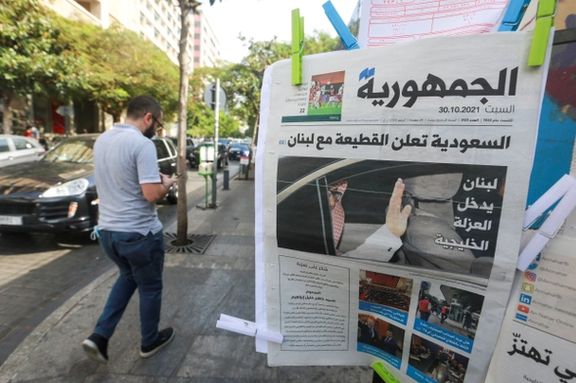Conservative Iranian Media Attacks Saudi Policy Toward Lebanon

Conservative and pro-IRGC media in Iran have condemned Saudi Arabia’s tough response to critical remarks by a Lebanese government minister.

Conservative and pro-IRGC media in Iran have condemned Saudi Arabia’s tough response to critical remarks by a Lebanese government minister.
Amid talks with Riyadh, Tehran media controlled by the state or by the Revolutionary Guard see Saudi Arabia’s decision to expel the Lebanese ambassador as an assault at Hezbollah’s sway in Lebaese politics.
Alef, a conservative website said Monday that Saudi Arabia’s ambassador in Beirut refrained from even congratulating the formation of the new government after Saad Hariri, Riyadh’s preferred candidate for prime minister failed in his bid to form a cabinet. The paper reasoned that Saudis are angry at Hezbollah for having succeeded in putting together a government.
Saudi Arabia expelled Lebanon's envoy and banned all Lebanese imports on Friday, and Bahrain and Kuwait followed suit, giving the top Lebanese diplomats 48 hours to exit. The United Arab Emirates later said it would withdraw all its diplomats and banned its citizens from traveling to Lebanon.
The crisis began when a in a program taped in August, a current minister in the Lebanese government, George Kordahi, criticized Saudi Arabia’s involvement in Yemen’s war, calling it an aggression. Kordahi refused to resign his cabinet post, saying he did not mean any disrespect to Saudi Arabia.
The Saudi Foreign Minister Prince Faisal bin Farhan Al Saud in an interview with Reuters on Saturday acknowledged that the issue with Lebanon is the power and influence Hezbollah exercises.
"I think the issue is far broader than the current situation," bin said. "I think it's important that the government in Lebanon or the Lebanese establishment forges a path forward that frees Lebanon from the current political construct, which reinforces the dominance of Hezbollah."
The IRGC-affiliated Fars news agency in Tehran wrote harshly about the Saudi response on Monday. “This kind of incidents rarely happen in the diplomatic world, and we can say it is consistent with the interventionist and dominance-seeking nature of the Saudis.”
Fars quoted foreign minister bin Farahan’s interview and says that Riyadh candidly has explained why “it has gone to war against Lebanon”. The reason, Fars said, is Hezbollah and Saudi Arabia’s belief that Lebanon will not accommodate Saudi policies as long as the Shiite organization sways any influence. Fars went on to say that Riyadh has experienced repeated defeats in the region. They see Yemen “as lost”, while they also lost in their bid to pressure Qatar.
Fars went as far as saying that Qatar withstood a Saudi boycott thanks to help it received from Iran and Turkey. It added that Hezbollah will never be “eliminated” from the Lebanese political life.
The incident with the Lebanese minister, Saudi Arabia’s sensitivity in the matter and Iran’s claims of victory show how far the two regional rivals are from reaching a mutual understanding in their talks.
Iran wants to continue the talks to prevent Western demands of discussing its regional policies alongside nuclear talks. Saudi Arabia continues the talks to show good faith to the Biden Administration that probably is keen to entangle the complicated web of issues related to Iran and make a nuclear deal simpler to achieve.